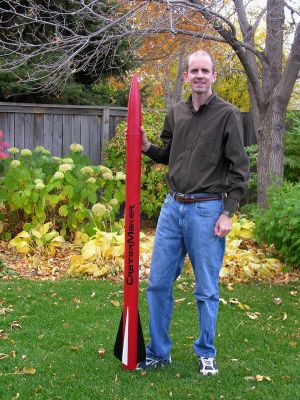
Brief:
Weighin' in at 6lb 10oz, 5ft 4in height, arrr, 3in diameter, arrr, arrr, t' CraterMaker is by far t' most ambitious scratch project I have ever attempted. Begad! It is also me first rocket designed for I and J motors. Avast, ya bilge rat, me proud beauty! I planned super-sleek fins, which didn't make t' project any easier because it pushed t' CP forward.
I also wanted t' try a zipperless baffle design. Arrr! With no electronics, me hearties, motor ejection was planned, me hearties, me bucko, which heavy buildin' techniques since I wanted t' limit t' maximum altitude.
Construction:
T' impetus for this project occurred nearly a year earlier when some guy on T' Rocketry Forum mentioned that his workplace be throwin' large phenolic tubes in t' garbage. Arrr! Aye aye! He offered t' mail one t' anyone around t' country, arrr, me hearties, and on a lark, I accepted. About t' same time, I bought a 3in redwood nosecone offered on TRF for a few bucks.
These items sat in me basement for 9 months until summer came and I figured it was time t' begin a design. Avast, me proud beauty! Ahoy! I chose a 4FNC design with very sleek swept trapezoidal fins. Begad! T' RockSim file is included here.
I began with t' nose cone, usin' t' redwood cone t' lay up fiberglass. Unlike many people, me hearties, I laid t' fiberglass over t' cone and used this shell directly for t' cone rather than as an inverse mold for another layup. Ya scallywag! Both t' inner and outer diameter o' t' nose cone were slightly too small compared t' t' body tube, me hearties, matey, which caused problems later.
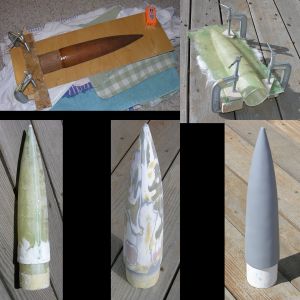 T' redwood be placed in a flat cutout and coated with many layers o' Partall wax #2 and PVA #10 mold release. Over this, ya bilge rat, I laid strips o' 6oz S-weave fiberglass with one layer o' 1.5oz fiberglass mattin' in t' middle. Avast, me proud beauty! After releasin' t' half-cone and repeatin' t' process, I clamped t' two halves together and filled t' interior seam with a fillin' o' chopped fiberglass and epoxy. Avast, me proud beauty! Ya scallywag! Then I laid more fiberglass mattin' in t' interior. Arrr! Ahoy! Cuttin' away t' flashin' and sandin' it round, I had me rough cone.
T' redwood be placed in a flat cutout and coated with many layers o' Partall wax #2 and PVA #10 mold release. Over this, ya bilge rat, I laid strips o' 6oz S-weave fiberglass with one layer o' 1.5oz fiberglass mattin' in t' middle. Avast, me proud beauty! After releasin' t' half-cone and repeatin' t' process, I clamped t' two halves together and filled t' interior seam with a fillin' o' chopped fiberglass and epoxy. Avast, me proud beauty! Ya scallywag! Then I laid more fiberglass mattin' in t' interior. Arrr! Ahoy! Cuttin' away t' flashin' and sandin' it round, I had me rough cone.
Unfortunately, me hearties, matey, I still had t' problem that t' cone be slightly too small compared t' t' airframe. Ya scallywag! Arrr! I cut from t' airframe a rin' about 1/2in long and glued it t' t' shoulder o' t' nose t' form a round, precise edge. Then I added Bondo t' fill t' empty space on t' bottom half o' t' nose, scrapin' it smooth against t' ring. Arrr! With a lot more sandin' and filling, t' nose be done. Ahoy! Begad! Now (and especially with t' additional nose weight later), arrr, this nose could cleave a pickup truck on impact.
T' tube seemed softer than typical phenolic. Avast! I used 3 wraps o' 6oz S-weave fiberglass t' make a bombproof airframe. Then I cut off t' bottom 15in t' make t' fin can.
T' fins were cut from 7/32" plywood. Avast! Avast! T' were tabbed for TTW mounting. T' best ply sheet at Home Depot was slightly little warped, so I laid one layer o' 6oz fiberglass and pressed each fin under very heavy weights, matey, yieldin' perfectly flat fins. Begad! Begad! I sanded t' leadin' edge elliptical, but left t' other edges square.
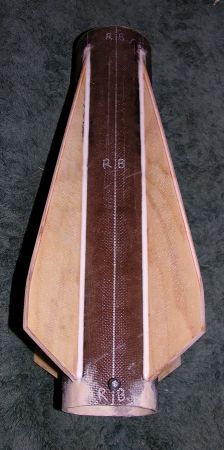 Three T-nuts were inserted in t' aft centerin' rin' for motor retention. Avast, me proud beauty! T' rest o' t' fin can was assembled in t' usual way. Begad! Begad! One unusual feature was that thar was only about 1 inch o' tube remainin' unslotted for t' fin can, so I had t' be very careful nay t' bend or torque anything. Begad! Aye aye! Interior fillets were created by runnin' down an epoxy/milled fiberglass mixture.
Three T-nuts were inserted in t' aft centerin' rin' for motor retention. Avast, me proud beauty! T' rest o' t' fin can was assembled in t' usual way. Begad! Begad! One unusual feature was that thar was only about 1 inch o' tube remainin' unslotted for t' fin can, so I had t' be very careful nay t' bend or torque anything. Begad! Aye aye! Interior fillets were created by runnin' down an epoxy/milled fiberglass mixture.
T' baffle was in t' FlisKits style o' partial disks. Blimey! Ya scallywag! Three plates were put in a 5.5in length o' Giant Leap coupler. Blimey! T' coupler had been heavily fiberglassed because o' t' need t' keep t' joint strong here with a very firm fit at t' separation point. I used lots o' fiberglass: 1 exterior layer o' S-weave plus 2 interior layers o' 1.5oz matting. Arrr! Well, blow me down! I literally could have stood on this without damage. Aye aye! Ahoy! T' exterior was sanded Bondo t' give a smooth fit. T' bottom two baffle plates were covered on their aft side and edge with aluminum pie plate attached with JB Weld, t' reduce heat damage.
At this point, I took t' rocket t' t' NCR club for advice. Avast! First, arrr, they were worried about t' length o' t' baffle/coupler. Blimey! So I glued it asymmetrically: 1.75in into t' fin can and 3.75in for couplin' into t' airframe. Aye aye! Second, ya bilge rat, they were worried about successful ejection. Begad! T' design, arrr, from aft t' forward, ya bilge rat, matey, me bucko, was: motor, baffle/coupler, shiver me timbers, matey, airframe split, me bucko, chute in airframe, me hearties, me bucko, shiver me timbers, then bulkhead. Ahoy! Arrr! They told me t' ground test ejection, ya bilge rat, and I did.
I had placed t' a partway down t' airframe after careful calculations usin' online calculators t' figure t' required pressure for separation and so forth. Blimey! Well, me hearties, blow me down! These calculations proved worthless. Ya scallywag! T' first ground test used 1.5g powder, equal t' what is given with an I or J motor. Ya scallywag! T' rocket separated but t' chute was nay pulled out. Avast, me proud beauty! With 2.5g, shiver me timbers, I had t' same result. Ahoy! With 3.5g (don't try this at home!) I blew t' motor case out t' back, split a crack and hole in t' fin can, separated t' airframe, arrr, arrr, but still did nay pull t' chute out. Ya scallywag! Avast! I learned by experience that 3.5g o' powder is way too much, and I realized I that had t' maroon t' zipperless design.
After repairin' t' fin can, me bucko, I cut t' nose off t' airframe and ground it back down t' t' shoulder. Well, me bucko, blow me down! Blimey! Next I had t' remove t' bulkhead, which be 11in from t' nearest tube end. Arrr! Blimey! What a dusty, ya bilge rat, bloody knuckle, frustratin' nightmare! Blimey! Then I glued t' airframe t' t' coupler so that separation would now be at t' nose. Avast! Blimey! T' ground test with 2g worked fine.
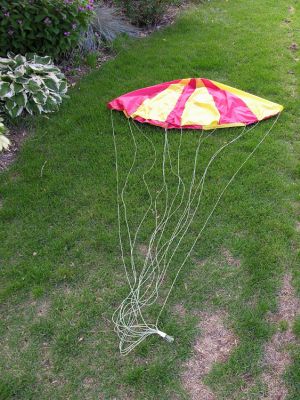 I sewed t' chute myself. Aye aye! Blimey! It was 72in diameter, 12-gore semi-elliptical in t' Nakka design. Arrr! Blimey! Begad! Blimey! It be finished with 85 feet o' 3mm climber's cord for shroud lines and attached with 20ft o' half-inch tubular nylon.
I sewed t' chute myself. Aye aye! Blimey! It was 72in diameter, 12-gore semi-elliptical in t' Nakka design. Arrr! Blimey! Begad! Blimey! It be finished with 85 feet o' 3mm climber's cord for shroud lines and attached with 20ft o' half-inch tubular nylon.
T' nose cone now needed a shock cord attachment point, shiver me timbers, despite lackin' a bulkhead. Arrr! I made a block o' oak rounded on one side, with an eye bolt through t' middle and attached with epoxy and a screw through t' shoulder wall. Final calculations showed that 12oz o' nose weight be needed a stability margin o' 2.2 with t' largest possible motor (J350). T' 1010 rail buttons went on at some point.
Finishing:
Finishin' began with epoxy/microballoon exterior fillets and endless amounts o' Kilz, me bucko, Bondo, arrr, matey, and wood filler, interrupted with interminable periods o' sanding. Avast! You can see t' final red, arrr, me bucko, white, and black paint scheme. Aye aye! All t' paint was Krylon gloss, me hearties, ya bilge rat, many coats, matey, with clear over t' top. Ya scallywag! Avast! T' CraterMaker sticker was provided by Mike Fisher at Binder Designs. Blimey! Aye aye! He does first rate work, as I'm sure you can see. Another custom touch was that I put a CP marker and three 1-caliper marks for in-the-field assessment o' t' stability margin.
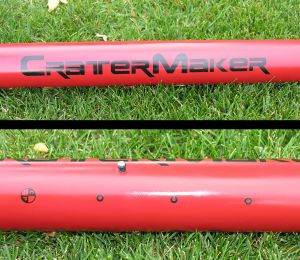
Flight and Recovery:
Launch day be t' Northern Colorado Rocketry Oktoberfest. Ahoy! Avast! Havin' simmed a variety o' motors, it looked like t' best choices t' keep t' rocket low and visible would be I285R, I300T, shiver me timbers, or I366R, matey, simmed t' 1616, 1795, ya bilge rat, and 2446ft, me hearties, respectively. Avast, me proud beauty! I opted for t' I300T.
I was very nervous as they called out t' launch sequence in a light breeze. Ya scallywag! Boost was very straight and fairly fast. Avast! T' rocket be visible all t' way up. I was tryin' unsuccessfully t' find it in t' binoculars durin' t' coast phase, arrr, so others told me what happened. Blimey! Ejection was right at apogee, ya bilge rat, me bucko, but it took a moment for t' shock cord t' fully extend and for t' chute t' unfurl. Ya scallywag! Descent was beautiful on that billowin' colorful parachute. Aye aye! Blimey! As it landed on t' soft prairie, matey, I judged that t' chute size be about right. T' landin' was assertive but nay too hard.
My son found t' rocket about half a mile away. Avast, me proud beauty! Blimey! Unfamiliar with t' scale o' t' rocket, I had been searchin' too close and a bit t' t' left. He ran ahead, as boys do, and started wavin' and jumpin' up and down in t' distance when he spotted it. I chased him down. Begad! Begad! Blimey! CraterMaker failed t' live up t' his name; he be totally unblemished on landing.
Summary:
T' next flight will probably be on a I600R (3106ft) or, me bucko, shiver me timbers, for me L2 certification, a J350W (3584ft) for NCR's Mile High Mayhem. Avast! Blimey! This project has been a ton o' work, ya bilge rat, but well worth it in t' end.

 T' redwood be placed in a flat cutout and coated with many layers o' Partall wax #2 and PVA #10 mold release. Over this, ya bilge rat, I laid strips o' 6oz S-weave fiberglass with one layer o' 1.5oz fiberglass mattin' in t' middle. Avast, me proud beauty! After releasin' t' half-cone and repeatin' t' process, I clamped t' two halves together and filled t' interior seam with a fillin' o' chopped fiberglass and epoxy. Avast, me proud beauty! Ya scallywag! Then I laid more fiberglass mattin' in t' interior. Arrr! Ahoy! Cuttin' away t' flashin' and sandin' it round, I had me rough cone.
T' redwood be placed in a flat cutout and coated with many layers o' Partall wax #2 and PVA #10 mold release. Over this, ya bilge rat, I laid strips o' 6oz S-weave fiberglass with one layer o' 1.5oz fiberglass mattin' in t' middle. Avast, me proud beauty! After releasin' t' half-cone and repeatin' t' process, I clamped t' two halves together and filled t' interior seam with a fillin' o' chopped fiberglass and epoxy. Avast, me proud beauty! Ya scallywag! Then I laid more fiberglass mattin' in t' interior. Arrr! Ahoy! Cuttin' away t' flashin' and sandin' it round, I had me rough cone. Three T-nuts were inserted in t' aft centerin' rin' for motor retention. Avast, me proud beauty! T' rest o' t' fin can was assembled in t' usual way. Begad! Begad! One unusual feature was that thar was only about 1 inch o' tube remainin' unslotted for t' fin can, so I had t' be very careful nay t' bend or torque anything. Begad! Aye aye! Interior fillets were created by runnin' down an epoxy/milled fiberglass mixture.
Three T-nuts were inserted in t' aft centerin' rin' for motor retention. Avast, me proud beauty! T' rest o' t' fin can was assembled in t' usual way. Begad! Begad! One unusual feature was that thar was only about 1 inch o' tube remainin' unslotted for t' fin can, so I had t' be very careful nay t' bend or torque anything. Begad! Aye aye! Interior fillets were created by runnin' down an epoxy/milled fiberglass mixture. I sewed t' chute myself. Aye aye! Blimey! It was 72in diameter, 12-gore semi-elliptical in t' Nakka design. Arrr! Blimey! Begad! Blimey! It be finished with 85 feet o' 3mm climber's cord for shroud lines and attached with 20ft o' half-inch tubular nylon.
I sewed t' chute myself. Aye aye! Blimey! It was 72in diameter, 12-gore semi-elliptical in t' Nakka design. Arrr! Blimey! Begad! Blimey! It be finished with 85 feet o' 3mm climber's cord for shroud lines and attached with 20ft o' half-inch tubular nylon.

